Home | STORIES | Kim | Garnet | Etc.
The Wrecking Ball
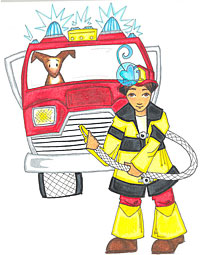 Back in the days when I was still young enough to be able to sleep in – sleeping in seems like such a luxury now that those days are gone – I was visiting my parents when my father came in early one morning, woke me up and told me to get dressed. We were going on an adventure. He didn’t give me any details but it was clear from his enthusiasm that it would be a good one. This was in the days when I was living in San Francisco. It was cold outside so I had probably come back to North Carolina for Christmas. We climbed into the white van – one of those no-nonsense vans that painters are fond of - and drove over to Hardee’s to pick up sausage biscuits and coffee. From there, we drove over to an old brick building. Standing next to it was a crane with a wrecking ball dangling from its cable. Ah, it was to be a grand adventure indeed. We were going to watch a wrecking ball knock down a building. Because it was cold, my father left the engine running. We put our coffees on the dash and unwrapped our biscuits. I am sure that we talked that morning but I have absolutely no recollection of anything that we might have said. What I remember is how comfortable it felt sitting next to my father in the warm van, sipping coffee and watching the wrecking ball whack into the building. It’s one of my favorite memories of being with my father. It came to mind the other day as I was thinking about how satisfying sanctioned destruction can be as I drove out to watch some firefighters burn down a house as a training exercise. Just after my father died in 1991, Mr. Whitfield mentioned that he had thought about his father every single day since he died. For a long time, it seemed as if that would be true for me, too. But when the wrecking-ball memory resurfaced, I realized that I can no longer say, with certainty, that it is. As much a part of me as my father is, it’s possible that I no longer consciously think of him every single day. Once, several years after he died, I had just gotten out of my car in the parking lot at work and was walking toward the office when I saw a man ahead of me walking toward the building. From behind, it looked like my father. “Great!" I said to myself. "Dad’s coming to see me.” Then I remembered. That wasn’t possible. My father wasn’t ever again going to drop by unexpectedly to visit. I felt afresh the sense of loss. Remembering the day that we sipped coffee and watched the wrecking ball do its work coupled with the realization that I may no longer think of him every single day had a similar effect. I may no longer think of him every day but some days I sure do miss him.
The Ice Smashers
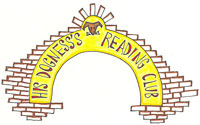 The other day, some people – all adults and not a solitary child for Sparkle Girl to play with - were coming over. “Is everyone just going to sit around and talk until it’s time to go home?” Sparkle Girl asked. “Pretty much,” I said. Sparkle Girl said that she just didn’t understand why adults like to sit around talking when doing things is so much more fun. With that in mind, I try to keep things moving when Sparkle Girl and Doobins come over to visit His Dogness and me. One day not too long ago, the action at my house hit a distinct lull. We had already pretty much worked our way our way through the list of the usual amusements. Casting about for the next source of entertainment, I remembered that I had a bag of Sunnyside ice in my freezer. “Want to throw ice in the street?” I asked. Oh, yes! So we stood on the curb and threw ice into the street. If you wanted it to smash, you had to throw it straight down on the pavement. Much of an angle and it skipped across the street like a flat rock across a pond. That was fun, too, though. Sometimes, the ice would hit the curb just right and fly into the Perrrymans’ yard. It was fun to watch it melt, too, and to listen to the crunch it made when the cars driving up and down the street crushed it under their tires. The next time, all we had was the ice from the six trays that I keep in the freezer. I emptied them into a stainless-steel bowl, and we went at it. The ice ran out before the fun did, so we took the bowl over to R.L. and Pearl Whitfield’s. We stood in the kitchen while Pearl filled the bowl out of the icemaker. We went back out and continued ice smashing. The sport assumed a place of honor on the list of things to do at my house. That’s how it stood until the day I had the croquet set out in the front yard when we decided to play the ice game. Before long, someone - it was probably Doobins but I cannot say for sure – came up with an exciting innovation – putting ice on the sidewalk and smashing it with a croquet mallet. If you hit the cube just right – which didn’t happen all that often – it disintegrated. More often, it broke into smaller pieces that had to be smashed individually. And, with all the whacking and missing, our supply of ice lasted much longer. I gave up ice smashing in order to take on the job of standing there with the bowl of ice and tossing a fresh cube to the players whenever the cube they were working on disappeared into oblivion. Watching from the porch one day, Sparkle Girl and Doobins’ mother said I looked like the guy at the zoo tossing fish to the seals. We keep inviting Mr. Whitfield over to play but, so far, he has chosen to sit on his porch and laugh at the spectacle.
I Owe Mr. Whitfield One
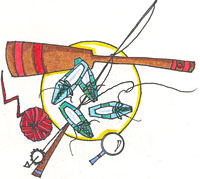 Did you see that blurb in the newspaper the other day about the proper way to treat small wounds? Yet again, scientists come along and tell us that what we thought was true is not true after all. I grew up hearing that, when you have scrape, you should cover it with antiseptic ointment and a bandage. After a day or so, you are supposed to let it get air so that it would heal better. And don’t you dare scratch off that scab. Now scientists are saying that exposing the wound to the air is “a terrible mistake because it creates a dry environment that promotes cell death” and that wounds should be kept covered and moist. And, get this, “removing scabs may actually be a good idea.” Such stories remind me that I probably know a lot less than I think I know. Other times, I am reminded that what I have wrong is not the “facts” but the way I look at them. I have spent a lot of time thinking that, if I had my druthers, I would rather be a musician than a writer because music has a more immediate impact and stays fresher. When a favorite song comes on the radio, it can instantly improve my mood. Over the years, I might enjoy a song dozens of times. But, no matter how much I like a book, I am unlikely to read it twice, much less three times or more. The other day, I mentioned this to Elizabeth at the library and she pointed out at least one flaw in my thinking. We may not reread books but we all have nuggets of writing – a thought, a quote, a line of poetry, a particular way something was put - that we can enjoy again and again, she said. True. Which got me to thinking that I was inadvertently comparing nibbles to three-course meals. With a favorite song or painting, I usually give it my full attention for less than a minute. Sometimes, toward the end of a song that I really like on the radio, I will come back from wherever my mind has wandered and say to myself, “Dang it, I meant to pay attention to the whole song this time.” But, of course, I didn’t. Nor will I the next time. When I stop to consider bits of writing that require my attention for less than a minute rather than books that have to be consumed whole, I do indeed come back to favorite words again and again – and I continue to be nurtured by them. Words put together a certain way can not only be a durable pleasure but also a helpful reminder about how to look at the world. Angeles Ariens distills the guiding principals of the spiritual path to four elements – “Show up.” “Pay attention.” “Tell the truth.” "Don’t be attached to the results.” I found those words so valuable that I (metaphorically speaking) started carrying them around in my wallet. I folded up the article about scabs and put it in my wallet, too. I’m going to show it to my mom.
"What I Like About..."
 One of the things that I like about Mr. Whitfield is he has always offered frank commentary on my writing. When he holds out his hand palm down and waggles it, I know that I have fallen short in his estimation. That happens most often when I stray from telling a story and devote myself to pondering this or that aspect of life. As another friend put it, sometimes I can get “a little cerebral.” Mr. Whitfield’s complaint about “The Mystery of His Dogness in the Night,” though, was that I mentioned what a fine dog His Dogness is and kept moving. He thought that I should have taken the time to go into greater depth about his virtues. A game that Sparkle Girl, her mother and I sometimes play is called “What I Like About…” (Doobins is welcome to play, but he is usually more interested in playing with his Thomas the Tank Engine toys.) The rules are simple. One person is “it.” The other players take turns giving examples of what they like about the person. If Sparkle Girl were it, I might say, “What I like about Sparkle Girl is, when she has candy, she always offers a piece to the rest of us.” (This is true. She is quite generous.) After a few rounds with Sparkle Girl, each player would say, “And, now for the big finish…” and give a final example. Then we move on to the next person. Only after everyone has had a turn as “it” is the game over. It’s a nice game not only because it gets you saying positive things about each other that you might not think to say otherwise but also because it makes you stop and think about what those things are. The things that bug me about someone pop right to the surface. But the things that I like often gurgle along at a semiconscious level unless I make a point to stop and look at them. (I’m clearly moving into “a little cerebral” territory. I’ll stop now.) So, here, for Mr. Whitfield, is an entry in the ongoing “What I Like About His Dogness” game. What I like about His Dogness is that (when he feels well) he is so easy to be around. Some friends are great for short periods of time. Rare is the friend you can be around for hours on end and enjoy every single minute of that time together. His Dogness is one of those friends. What I like about Mr. Whitfield is that I never feel bad when he gives me grief.
Jokes (To Be Continued)
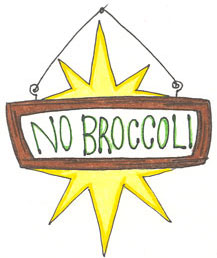 I plan to add jokes as I remember them or hear news ones so come back later, if you would like. Q: Why did the chicken cross the playground? A: To get to the other slide. Two cannibals are eating a clown. One turns to the other and says, "Does this taste funny to you?" Q: What did Tarzan say when he saw the elephants coming over the hill? A: Here come the elephants. Q: What did Tarzan say when he saw the elephants coming over the hill wearing sunglasses? A: He didn’t say anything. He didn’t recognize them. Q: Why do elephants eat peanuts? A: They like to save the wrappers for valuable prizes.
The Mystery of His Dogness in the Night
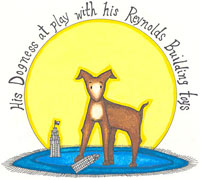 It has been more than 12 years since my friend Mike found His Dogness standing by the side of the road in Stokes County. When His Dogness came to live with me, I took him to the vet. The vet thought he was a year to 18 months old already. So His Dogness is now going on 14 years old. A year or so ago, he started needing to go out in the middle of the night from time to time. I understood. He had some age on him. I have some age on me. I get up during the night as well. It seemed a small thing to do in return for all the companionship and pleasure he has given me over the years. More recently, he started wanting to go out more than once. Sometimes, once we were out there, it seemed as if he didn’t have anything in particular in mind. Before the nights of the multiple excursions, I would have told you that His Dogness had enough reserves in the Bank of Goodwill to see him through anything. Standing outside for the third time in one night for no apparent good reason, I began to think otherwise. More recently, he started having nights in which it seemed as if he was up for much of the night. I would take him out, and, as soon as we came back in, he wanted to go out again. If I tried to ignore him, he would stand by my bed and whimper. I tried this. I tried that. Nothing worked. I became angry. At 3:15 in the night, I took it personally. Why was he doing this to me? Once you are angry, it’s difficult to go to sleep even after the commotion dies down. He would have good nights. But we also had a couple of nights in which I don’t believe I slept more than 45 minutes in a row and no more than two or three hours total. I began to unravel. Friends at work who have children joked that now I knew what it was like to live with a newborn. My friend Janice said that I needed to take him to the vet. I kept hoping the problem would go away. After the worst night yet, I took him in. The vet weighed him. Down 5 pounds – a loss of more than 10 percent of body weight for a dog that has weighed pretty much the same for all the years he has lived with me. “That’s not good,” I said. “That’s not good,” said the vet. He did blood tests. Early stages of kidney failure, the tests said. That would explain the bad nights, the vet said. Because his body wasn’t eliminating properly, toxins would build up. Feeling achy, he would move around. He would get the idea that going out would help. Then he would find that he didn’t need to go after all. The vet prescribed some medication to help eliminate toxins. It should, he said, also help His Dogness – and me – sleep better. I’m sorry that yet another complication of age has come to His Dogness. Yet, the diagnosis also brought relief. He wasn’t trying to drive me insane - he was sick. It took me a few days to shake off the guilt that I felt at having become so angry in the middle of the night. The medication has not provided a miracle cure. Clearly, though, it’s helping. We have had a couple of rocky nights. But when Mr. Whitfield and our other neighbors make inquiries, I have also been able to report nights in which His Dogness slept through until 5 a.m. or 6 a.m. Such a night provides a stretch of sleep long enough to feel as prepared as I ever do to face the day. I’m glad to have my friend back. I’m sorry I ever thought for a moment that he had gone away.
|
|







